Entrepreneurship: Factors Assisting and Obstructing in Australia
VerifiedAdded on 2023/06/08
|9
|2391
|393
Essay
AI Summary
This essay explores the vital role of entrepreneurship in driving Australia's economic productivity and prosperity, highlighting its contribution to job creation, innovation, and competition. It examines the factors fostering entrepreneurship, such as rising profit expectations, the increasing millennial workforce, digital disruption, and government tax breaks. The essay also analyzes hindrances to entrepreneurial growth, including government reforms, overqualified business professionals, and red tape. It emphasizes the need for government support to create a conducive environment for entrepreneurship, suggesting more flexible approval processes and corporate tax cuts to sustain economic prosperity. This document is available on Desklib, a platform offering a wide range of study tools and resources for students.
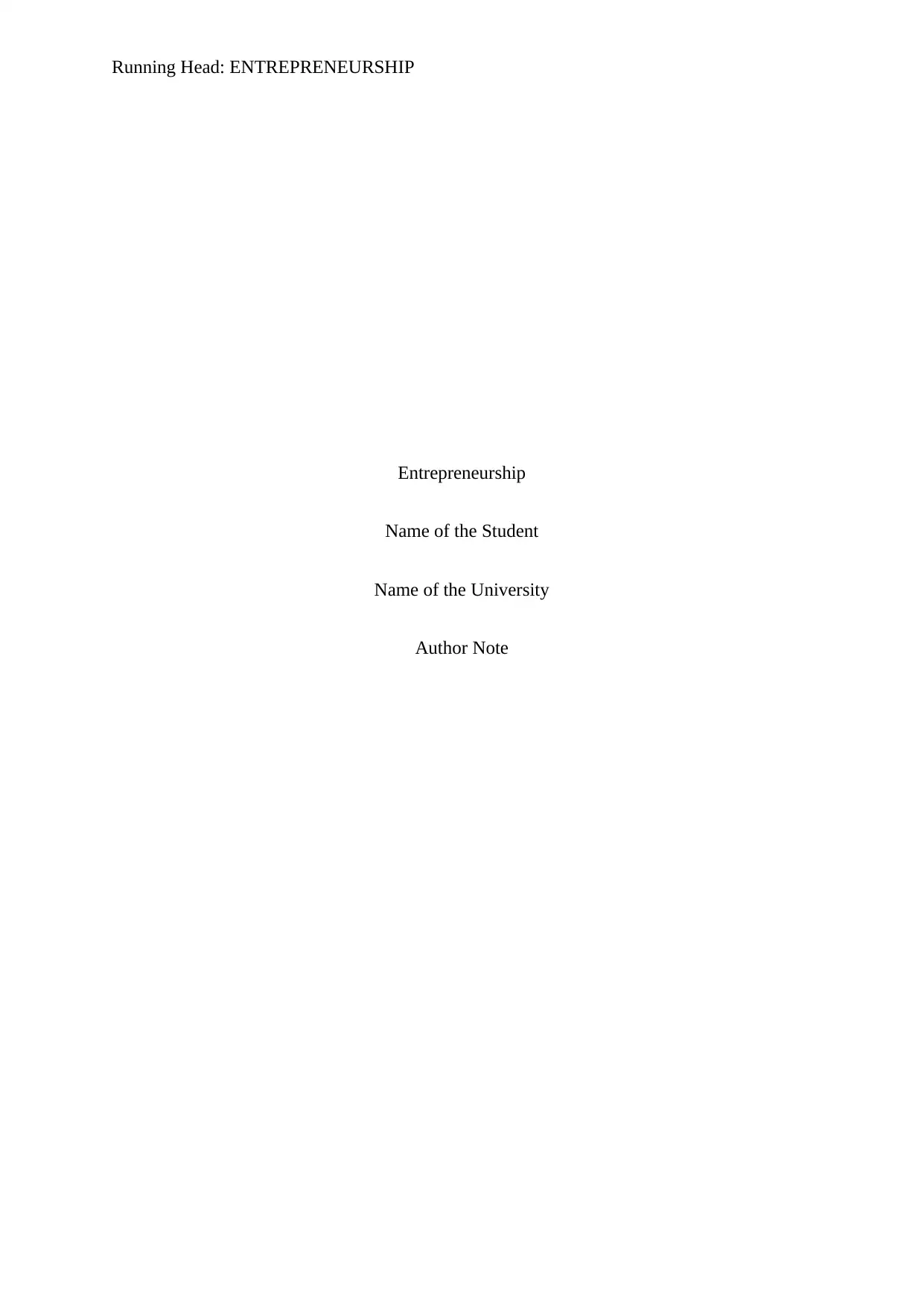
Running Head: ENTREPRENEURSHIP
Entrepreneurship
Name of the Student
Name of the University
Author Note
Entrepreneurship
Name of the Student
Name of the University
Author Note
Paraphrase This Document
Need a fresh take? Get an instant paraphrase of this document with our AI Paraphraser
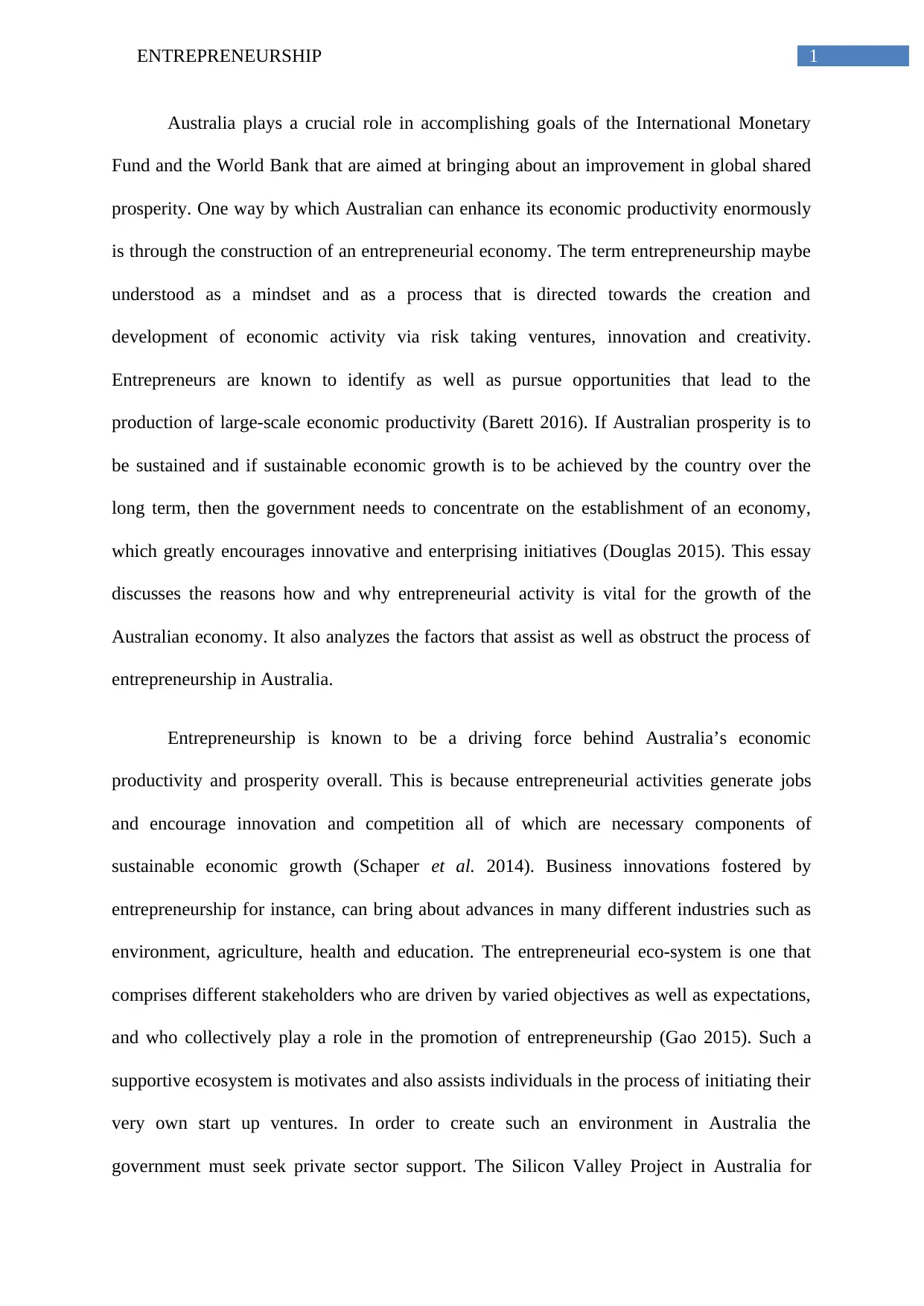
1ENTREPRENEURSHIP
Australia plays a crucial role in accomplishing goals of the International Monetary
Fund and the World Bank that are aimed at bringing about an improvement in global shared
prosperity. One way by which Australian can enhance its economic productivity enormously
is through the construction of an entrepreneurial economy. The term entrepreneurship maybe
understood as a mindset and as a process that is directed towards the creation and
development of economic activity via risk taking ventures, innovation and creativity.
Entrepreneurs are known to identify as well as pursue opportunities that lead to the
production of large-scale economic productivity (Barett 2016). If Australian prosperity is to
be sustained and if sustainable economic growth is to be achieved by the country over the
long term, then the government needs to concentrate on the establishment of an economy,
which greatly encourages innovative and enterprising initiatives (Douglas 2015). This essay
discusses the reasons how and why entrepreneurial activity is vital for the growth of the
Australian economy. It also analyzes the factors that assist as well as obstruct the process of
entrepreneurship in Australia.
Entrepreneurship is known to be a driving force behind Australia’s economic
productivity and prosperity overall. This is because entrepreneurial activities generate jobs
and encourage innovation and competition all of which are necessary components of
sustainable economic growth (Schaper et al. 2014). Business innovations fostered by
entrepreneurship for instance, can bring about advances in many different industries such as
environment, agriculture, health and education. The entrepreneurial eco-system is one that
comprises different stakeholders who are driven by varied objectives as well as expectations,
and who collectively play a role in the promotion of entrepreneurship (Gao 2015). Such a
supportive ecosystem is motivates and also assists individuals in the process of initiating their
very own start up ventures. In order to create such an environment in Australia the
government must seek private sector support. The Silicon Valley Project in Australia for
Australia plays a crucial role in accomplishing goals of the International Monetary
Fund and the World Bank that are aimed at bringing about an improvement in global shared
prosperity. One way by which Australian can enhance its economic productivity enormously
is through the construction of an entrepreneurial economy. The term entrepreneurship maybe
understood as a mindset and as a process that is directed towards the creation and
development of economic activity via risk taking ventures, innovation and creativity.
Entrepreneurs are known to identify as well as pursue opportunities that lead to the
production of large-scale economic productivity (Barett 2016). If Australian prosperity is to
be sustained and if sustainable economic growth is to be achieved by the country over the
long term, then the government needs to concentrate on the establishment of an economy,
which greatly encourages innovative and enterprising initiatives (Douglas 2015). This essay
discusses the reasons how and why entrepreneurial activity is vital for the growth of the
Australian economy. It also analyzes the factors that assist as well as obstruct the process of
entrepreneurship in Australia.
Entrepreneurship is known to be a driving force behind Australia’s economic
productivity and prosperity overall. This is because entrepreneurial activities generate jobs
and encourage innovation and competition all of which are necessary components of
sustainable economic growth (Schaper et al. 2014). Business innovations fostered by
entrepreneurship for instance, can bring about advances in many different industries such as
environment, agriculture, health and education. The entrepreneurial eco-system is one that
comprises different stakeholders who are driven by varied objectives as well as expectations,
and who collectively play a role in the promotion of entrepreneurship (Gao 2015). Such a
supportive ecosystem is motivates and also assists individuals in the process of initiating their
very own start up ventures. In order to create such an environment in Australia the
government must seek private sector support. The Silicon Valley Project in Australia for
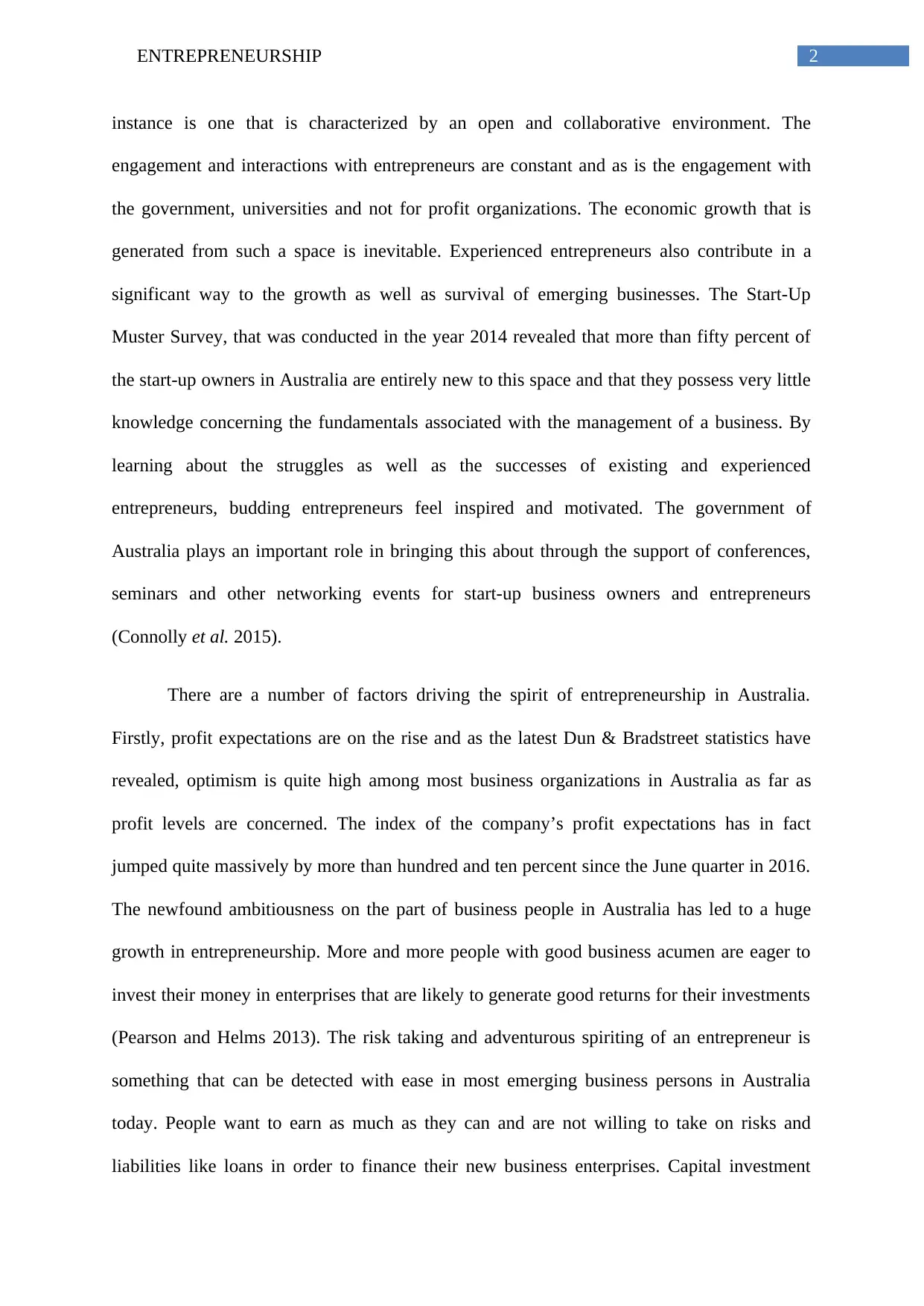
2ENTREPRENEURSHIP
instance is one that is characterized by an open and collaborative environment. The
engagement and interactions with entrepreneurs are constant and as is the engagement with
the government, universities and not for profit organizations. The economic growth that is
generated from such a space is inevitable. Experienced entrepreneurs also contribute in a
significant way to the growth as well as survival of emerging businesses. The Start-Up
Muster Survey, that was conducted in the year 2014 revealed that more than fifty percent of
the start-up owners in Australia are entirely new to this space and that they possess very little
knowledge concerning the fundamentals associated with the management of a business. By
learning about the struggles as well as the successes of existing and experienced
entrepreneurs, budding entrepreneurs feel inspired and motivated. The government of
Australia plays an important role in bringing this about through the support of conferences,
seminars and other networking events for start-up business owners and entrepreneurs
(Connolly et al. 2015).
There are a number of factors driving the spirit of entrepreneurship in Australia.
Firstly, profit expectations are on the rise and as the latest Dun & Bradstreet statistics have
revealed, optimism is quite high among most business organizations in Australia as far as
profit levels are concerned. The index of the company’s profit expectations has in fact
jumped quite massively by more than hundred and ten percent since the June quarter in 2016.
The newfound ambitiousness on the part of business people in Australia has led to a huge
growth in entrepreneurship. More and more people with good business acumen are eager to
invest their money in enterprises that are likely to generate good returns for their investments
(Pearson and Helms 2013). The risk taking and adventurous spiriting of an entrepreneur is
something that can be detected with ease in most emerging business persons in Australia
today. People want to earn as much as they can and are not willing to take on risks and
liabilities like loans in order to finance their new business enterprises. Capital investment
instance is one that is characterized by an open and collaborative environment. The
engagement and interactions with entrepreneurs are constant and as is the engagement with
the government, universities and not for profit organizations. The economic growth that is
generated from such a space is inevitable. Experienced entrepreneurs also contribute in a
significant way to the growth as well as survival of emerging businesses. The Start-Up
Muster Survey, that was conducted in the year 2014 revealed that more than fifty percent of
the start-up owners in Australia are entirely new to this space and that they possess very little
knowledge concerning the fundamentals associated with the management of a business. By
learning about the struggles as well as the successes of existing and experienced
entrepreneurs, budding entrepreneurs feel inspired and motivated. The government of
Australia plays an important role in bringing this about through the support of conferences,
seminars and other networking events for start-up business owners and entrepreneurs
(Connolly et al. 2015).
There are a number of factors driving the spirit of entrepreneurship in Australia.
Firstly, profit expectations are on the rise and as the latest Dun & Bradstreet statistics have
revealed, optimism is quite high among most business organizations in Australia as far as
profit levels are concerned. The index of the company’s profit expectations has in fact
jumped quite massively by more than hundred and ten percent since the June quarter in 2016.
The newfound ambitiousness on the part of business people in Australia has led to a huge
growth in entrepreneurship. More and more people with good business acumen are eager to
invest their money in enterprises that are likely to generate good returns for their investments
(Pearson and Helms 2013). The risk taking and adventurous spiriting of an entrepreneur is
something that can be detected with ease in most emerging business persons in Australia
today. People want to earn as much as they can and are not willing to take on risks and
liabilities like loans in order to finance their new business enterprises. Capital investment
⊘ This is a preview!⊘
Do you want full access?
Subscribe today to unlock all pages.

Trusted by 1+ million students worldwide
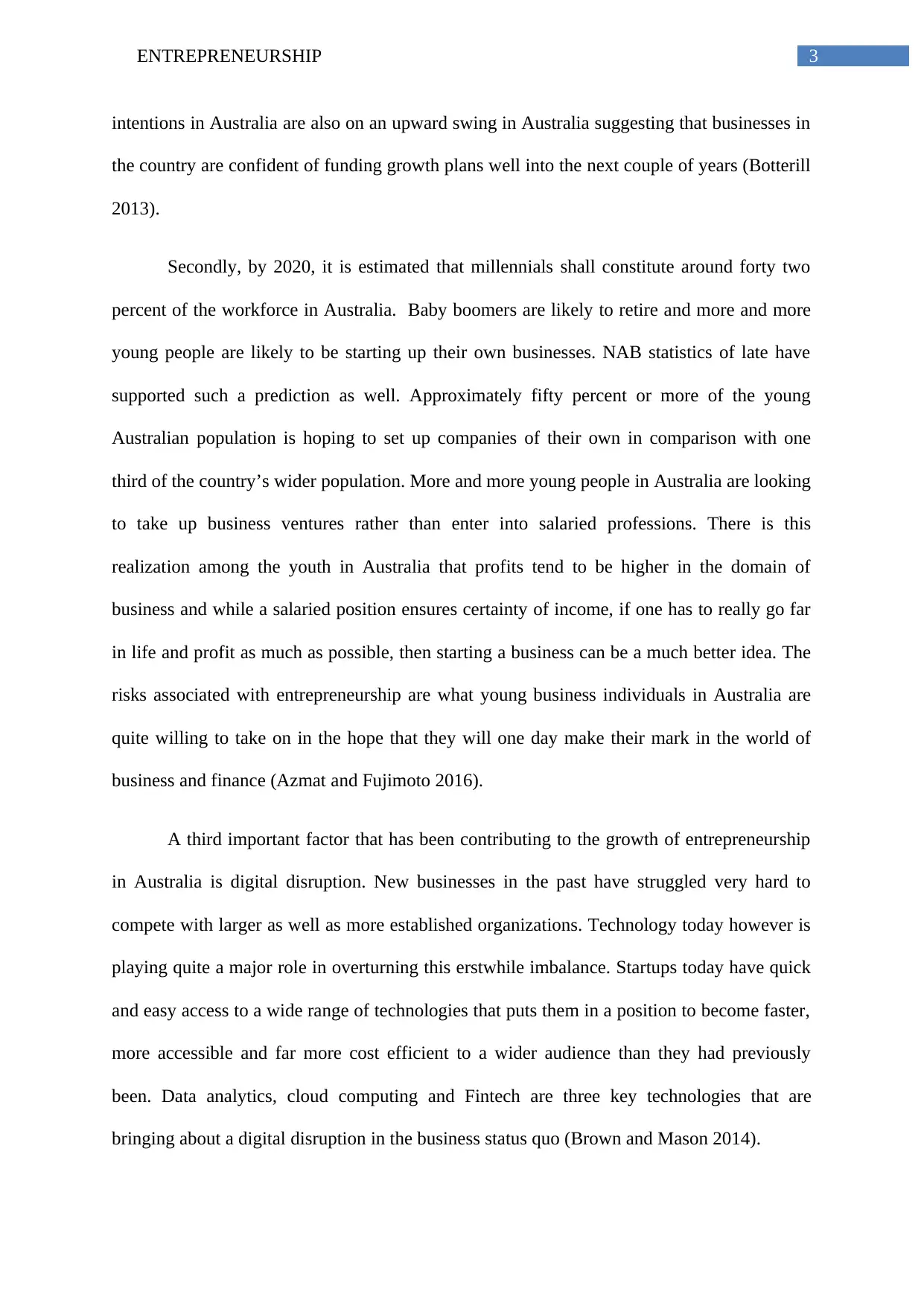
3ENTREPRENEURSHIP
intentions in Australia are also on an upward swing in Australia suggesting that businesses in
the country are confident of funding growth plans well into the next couple of years (Botterill
2013).
Secondly, by 2020, it is estimated that millennials shall constitute around forty two
percent of the workforce in Australia. Baby boomers are likely to retire and more and more
young people are likely to be starting up their own businesses. NAB statistics of late have
supported such a prediction as well. Approximately fifty percent or more of the young
Australian population is hoping to set up companies of their own in comparison with one
third of the country’s wider population. More and more young people in Australia are looking
to take up business ventures rather than enter into salaried professions. There is this
realization among the youth in Australia that profits tend to be higher in the domain of
business and while a salaried position ensures certainty of income, if one has to really go far
in life and profit as much as possible, then starting a business can be a much better idea. The
risks associated with entrepreneurship are what young business individuals in Australia are
quite willing to take on in the hope that they will one day make their mark in the world of
business and finance (Azmat and Fujimoto 2016).
A third important factor that has been contributing to the growth of entrepreneurship
in Australia is digital disruption. New businesses in the past have struggled very hard to
compete with larger as well as more established organizations. Technology today however is
playing quite a major role in overturning this erstwhile imbalance. Startups today have quick
and easy access to a wide range of technologies that puts them in a position to become faster,
more accessible and far more cost efficient to a wider audience than they had previously
been. Data analytics, cloud computing and Fintech are three key technologies that are
bringing about a digital disruption in the business status quo (Brown and Mason 2014).
intentions in Australia are also on an upward swing in Australia suggesting that businesses in
the country are confident of funding growth plans well into the next couple of years (Botterill
2013).
Secondly, by 2020, it is estimated that millennials shall constitute around forty two
percent of the workforce in Australia. Baby boomers are likely to retire and more and more
young people are likely to be starting up their own businesses. NAB statistics of late have
supported such a prediction as well. Approximately fifty percent or more of the young
Australian population is hoping to set up companies of their own in comparison with one
third of the country’s wider population. More and more young people in Australia are looking
to take up business ventures rather than enter into salaried professions. There is this
realization among the youth in Australia that profits tend to be higher in the domain of
business and while a salaried position ensures certainty of income, if one has to really go far
in life and profit as much as possible, then starting a business can be a much better idea. The
risks associated with entrepreneurship are what young business individuals in Australia are
quite willing to take on in the hope that they will one day make their mark in the world of
business and finance (Azmat and Fujimoto 2016).
A third important factor that has been contributing to the growth of entrepreneurship
in Australia is digital disruption. New businesses in the past have struggled very hard to
compete with larger as well as more established organizations. Technology today however is
playing quite a major role in overturning this erstwhile imbalance. Startups today have quick
and easy access to a wide range of technologies that puts them in a position to become faster,
more accessible and far more cost efficient to a wider audience than they had previously
been. Data analytics, cloud computing and Fintech are three key technologies that are
bringing about a digital disruption in the business status quo (Brown and Mason 2014).
Paraphrase This Document
Need a fresh take? Get an instant paraphrase of this document with our AI Paraphraser
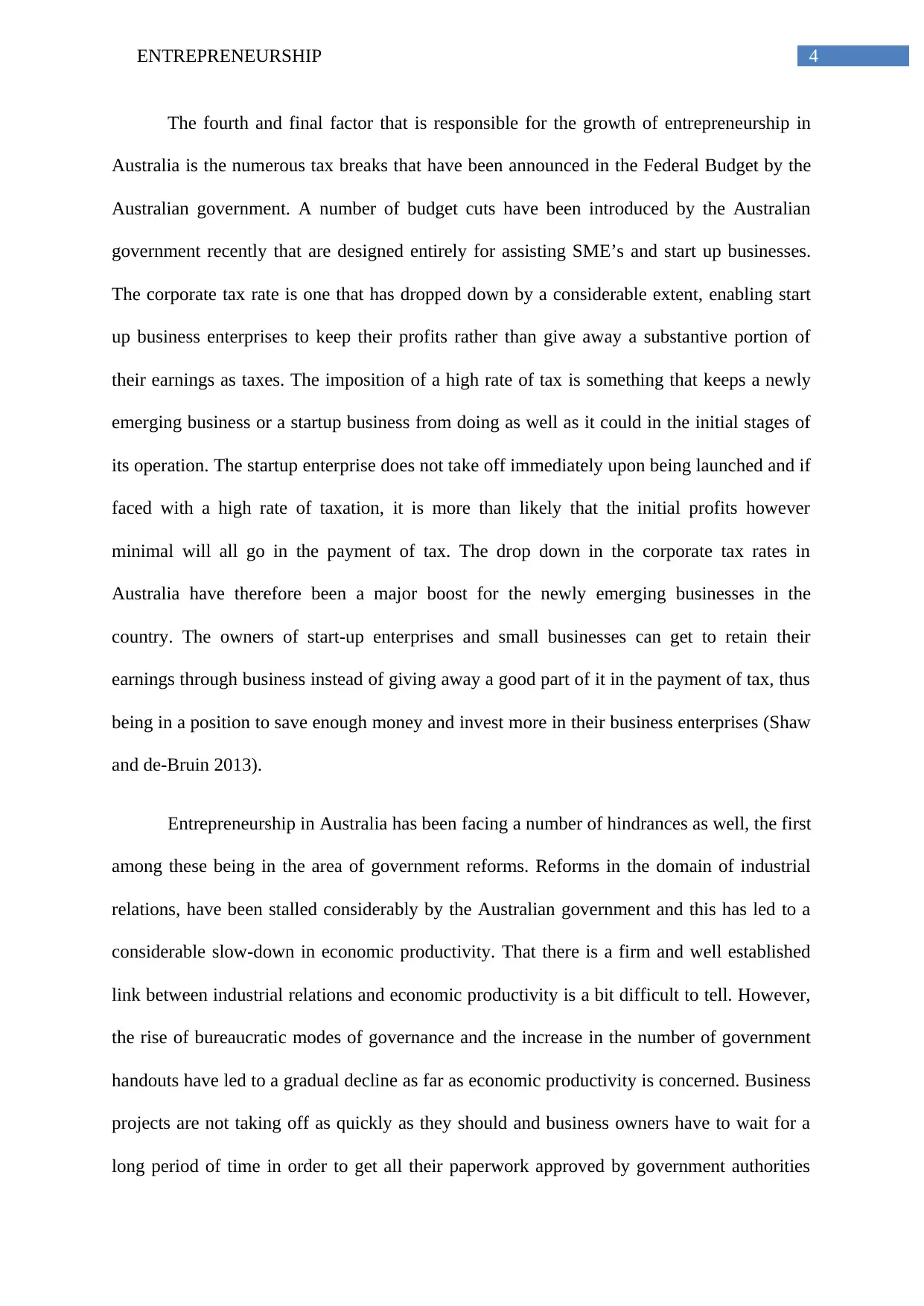
4ENTREPRENEURSHIP
The fourth and final factor that is responsible for the growth of entrepreneurship in
Australia is the numerous tax breaks that have been announced in the Federal Budget by the
Australian government. A number of budget cuts have been introduced by the Australian
government recently that are designed entirely for assisting SME’s and start up businesses.
The corporate tax rate is one that has dropped down by a considerable extent, enabling start
up business enterprises to keep their profits rather than give away a substantive portion of
their earnings as taxes. The imposition of a high rate of tax is something that keeps a newly
emerging business or a startup business from doing as well as it could in the initial stages of
its operation. The startup enterprise does not take off immediately upon being launched and if
faced with a high rate of taxation, it is more than likely that the initial profits however
minimal will all go in the payment of tax. The drop down in the corporate tax rates in
Australia have therefore been a major boost for the newly emerging businesses in the
country. The owners of start-up enterprises and small businesses can get to retain their
earnings through business instead of giving away a good part of it in the payment of tax, thus
being in a position to save enough money and invest more in their business enterprises (Shaw
and de-Bruin 2013).
Entrepreneurship in Australia has been facing a number of hindrances as well, the first
among these being in the area of government reforms. Reforms in the domain of industrial
relations, have been stalled considerably by the Australian government and this has led to a
considerable slow-down in economic productivity. That there is a firm and well established
link between industrial relations and economic productivity is a bit difficult to tell. However,
the rise of bureaucratic modes of governance and the increase in the number of government
handouts have led to a gradual decline as far as economic productivity is concerned. Business
projects are not taking off as quickly as they should and business owners have to wait for a
long period of time in order to get all their paperwork approved by government authorities
The fourth and final factor that is responsible for the growth of entrepreneurship in
Australia is the numerous tax breaks that have been announced in the Federal Budget by the
Australian government. A number of budget cuts have been introduced by the Australian
government recently that are designed entirely for assisting SME’s and start up businesses.
The corporate tax rate is one that has dropped down by a considerable extent, enabling start
up business enterprises to keep their profits rather than give away a substantive portion of
their earnings as taxes. The imposition of a high rate of tax is something that keeps a newly
emerging business or a startup business from doing as well as it could in the initial stages of
its operation. The startup enterprise does not take off immediately upon being launched and if
faced with a high rate of taxation, it is more than likely that the initial profits however
minimal will all go in the payment of tax. The drop down in the corporate tax rates in
Australia have therefore been a major boost for the newly emerging businesses in the
country. The owners of start-up enterprises and small businesses can get to retain their
earnings through business instead of giving away a good part of it in the payment of tax, thus
being in a position to save enough money and invest more in their business enterprises (Shaw
and de-Bruin 2013).
Entrepreneurship in Australia has been facing a number of hindrances as well, the first
among these being in the area of government reforms. Reforms in the domain of industrial
relations, have been stalled considerably by the Australian government and this has led to a
considerable slow-down in economic productivity. That there is a firm and well established
link between industrial relations and economic productivity is a bit difficult to tell. However,
the rise of bureaucratic modes of governance and the increase in the number of government
handouts have led to a gradual decline as far as economic productivity is concerned. Business
projects are not taking off as quickly as they should and business owners have to wait for a
long period of time in order to get all their paperwork approved by government authorities
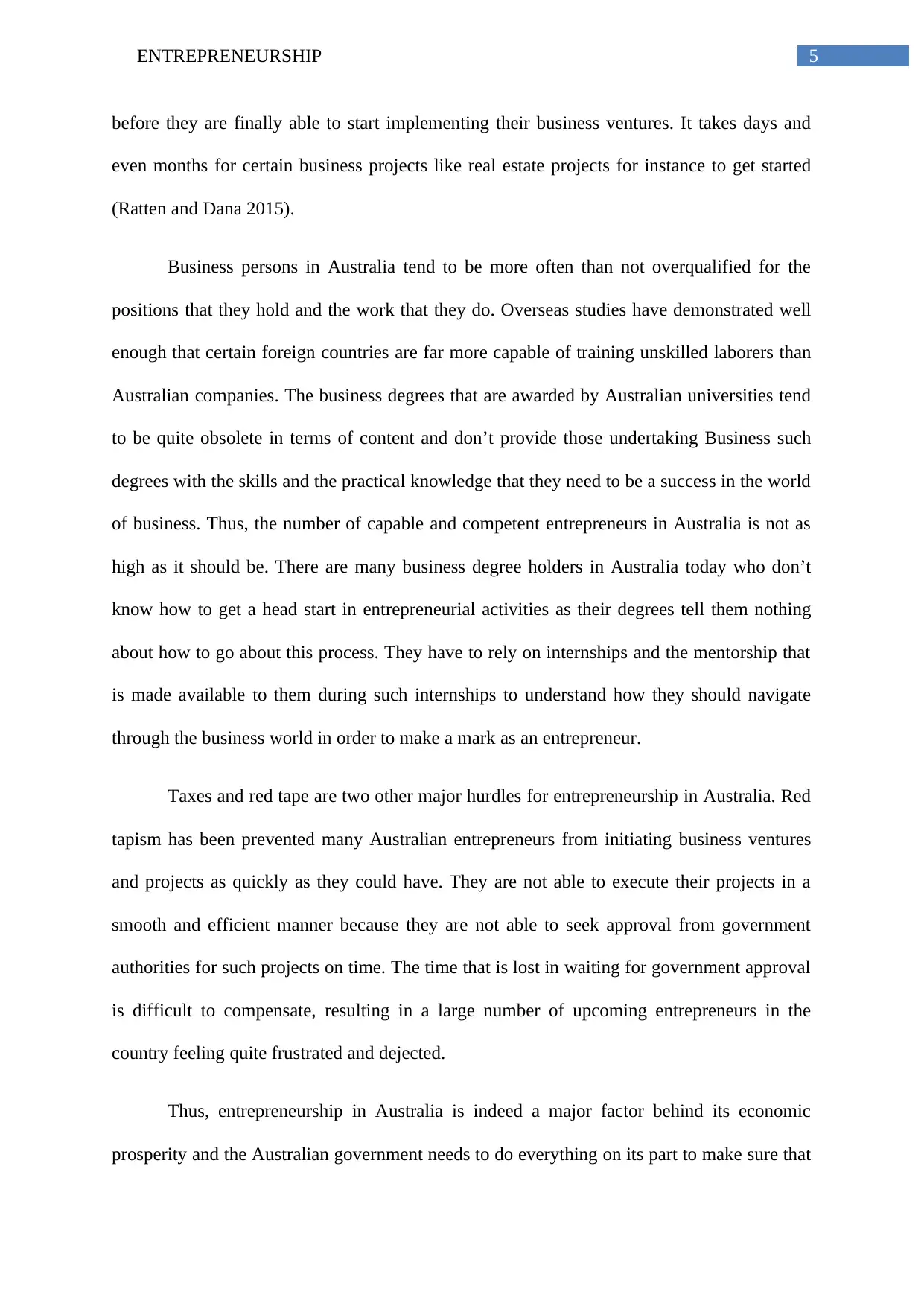
5ENTREPRENEURSHIP
before they are finally able to start implementing their business ventures. It takes days and
even months for certain business projects like real estate projects for instance to get started
(Ratten and Dana 2015).
Business persons in Australia tend to be more often than not overqualified for the
positions that they hold and the work that they do. Overseas studies have demonstrated well
enough that certain foreign countries are far more capable of training unskilled laborers than
Australian companies. The business degrees that are awarded by Australian universities tend
to be quite obsolete in terms of content and don’t provide those undertaking Business such
degrees with the skills and the practical knowledge that they need to be a success in the world
of business. Thus, the number of capable and competent entrepreneurs in Australia is not as
high as it should be. There are many business degree holders in Australia today who don’t
know how to get a head start in entrepreneurial activities as their degrees tell them nothing
about how to go about this process. They have to rely on internships and the mentorship that
is made available to them during such internships to understand how they should navigate
through the business world in order to make a mark as an entrepreneur.
Taxes and red tape are two other major hurdles for entrepreneurship in Australia. Red
tapism has been prevented many Australian entrepreneurs from initiating business ventures
and projects as quickly as they could have. They are not able to execute their projects in a
smooth and efficient manner because they are not able to seek approval from government
authorities for such projects on time. The time that is lost in waiting for government approval
is difficult to compensate, resulting in a large number of upcoming entrepreneurs in the
country feeling quite frustrated and dejected.
Thus, entrepreneurship in Australia is indeed a major factor behind its economic
prosperity and the Australian government needs to do everything on its part to make sure that
before they are finally able to start implementing their business ventures. It takes days and
even months for certain business projects like real estate projects for instance to get started
(Ratten and Dana 2015).
Business persons in Australia tend to be more often than not overqualified for the
positions that they hold and the work that they do. Overseas studies have demonstrated well
enough that certain foreign countries are far more capable of training unskilled laborers than
Australian companies. The business degrees that are awarded by Australian universities tend
to be quite obsolete in terms of content and don’t provide those undertaking Business such
degrees with the skills and the practical knowledge that they need to be a success in the world
of business. Thus, the number of capable and competent entrepreneurs in Australia is not as
high as it should be. There are many business degree holders in Australia today who don’t
know how to get a head start in entrepreneurial activities as their degrees tell them nothing
about how to go about this process. They have to rely on internships and the mentorship that
is made available to them during such internships to understand how they should navigate
through the business world in order to make a mark as an entrepreneur.
Taxes and red tape are two other major hurdles for entrepreneurship in Australia. Red
tapism has been prevented many Australian entrepreneurs from initiating business ventures
and projects as quickly as they could have. They are not able to execute their projects in a
smooth and efficient manner because they are not able to seek approval from government
authorities for such projects on time. The time that is lost in waiting for government approval
is difficult to compensate, resulting in a large number of upcoming entrepreneurs in the
country feeling quite frustrated and dejected.
Thus, entrepreneurship in Australia is indeed a major factor behind its economic
prosperity and the Australian government needs to do everything on its part to make sure that
⊘ This is a preview!⊘
Do you want full access?
Subscribe today to unlock all pages.

Trusted by 1+ million students worldwide
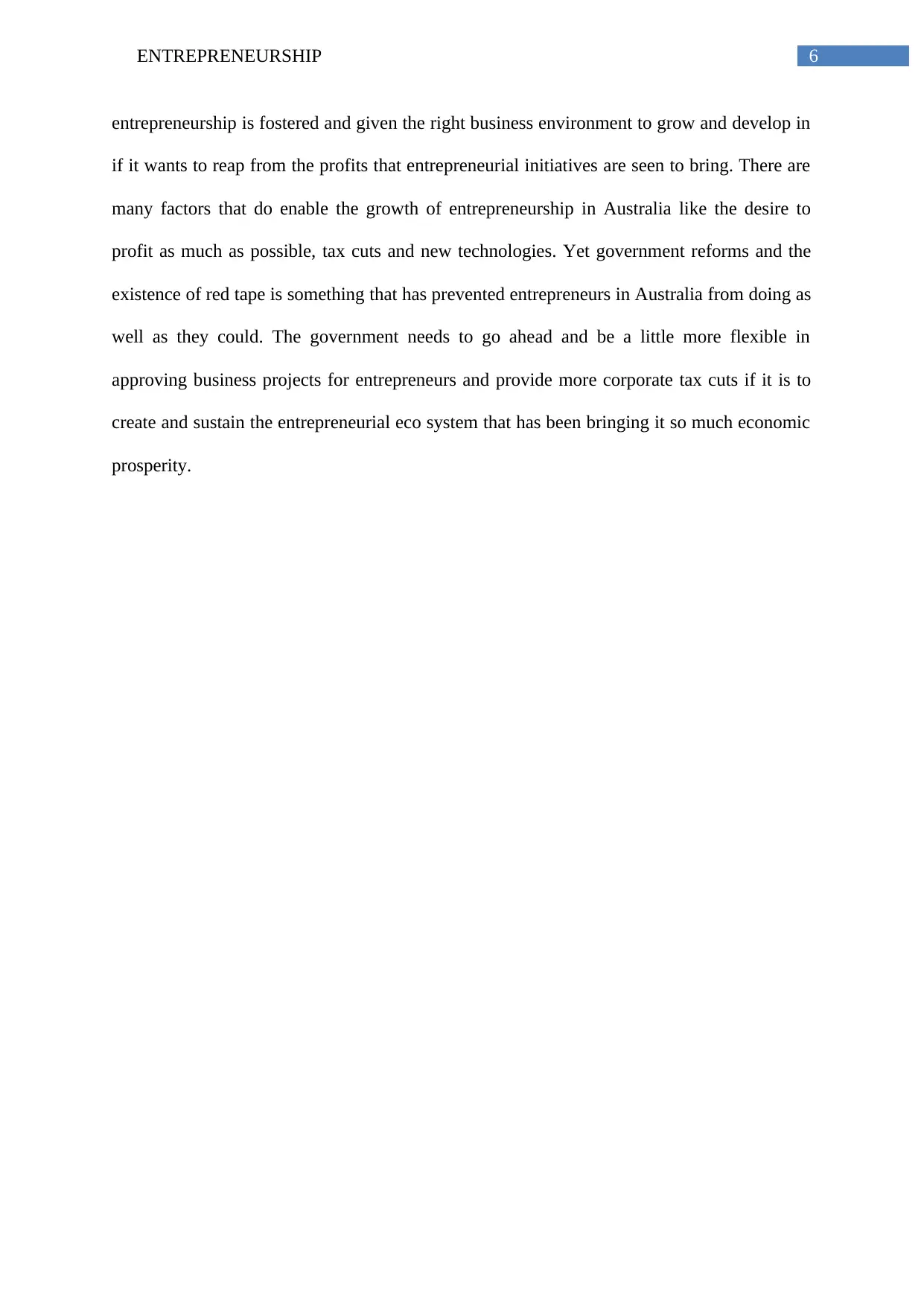
6ENTREPRENEURSHIP
entrepreneurship is fostered and given the right business environment to grow and develop in
if it wants to reap from the profits that entrepreneurial initiatives are seen to bring. There are
many factors that do enable the growth of entrepreneurship in Australia like the desire to
profit as much as possible, tax cuts and new technologies. Yet government reforms and the
existence of red tape is something that has prevented entrepreneurs in Australia from doing as
well as they could. The government needs to go ahead and be a little more flexible in
approving business projects for entrepreneurs and provide more corporate tax cuts if it is to
create and sustain the entrepreneurial eco system that has been bringing it so much economic
prosperity.
entrepreneurship is fostered and given the right business environment to grow and develop in
if it wants to reap from the profits that entrepreneurial initiatives are seen to bring. There are
many factors that do enable the growth of entrepreneurship in Australia like the desire to
profit as much as possible, tax cuts and new technologies. Yet government reforms and the
existence of red tape is something that has prevented entrepreneurs in Australia from doing as
well as they could. The government needs to go ahead and be a little more flexible in
approving business projects for entrepreneurs and provide more corporate tax cuts if it is to
create and sustain the entrepreneurial eco system that has been bringing it so much economic
prosperity.
Paraphrase This Document
Need a fresh take? Get an instant paraphrase of this document with our AI Paraphraser
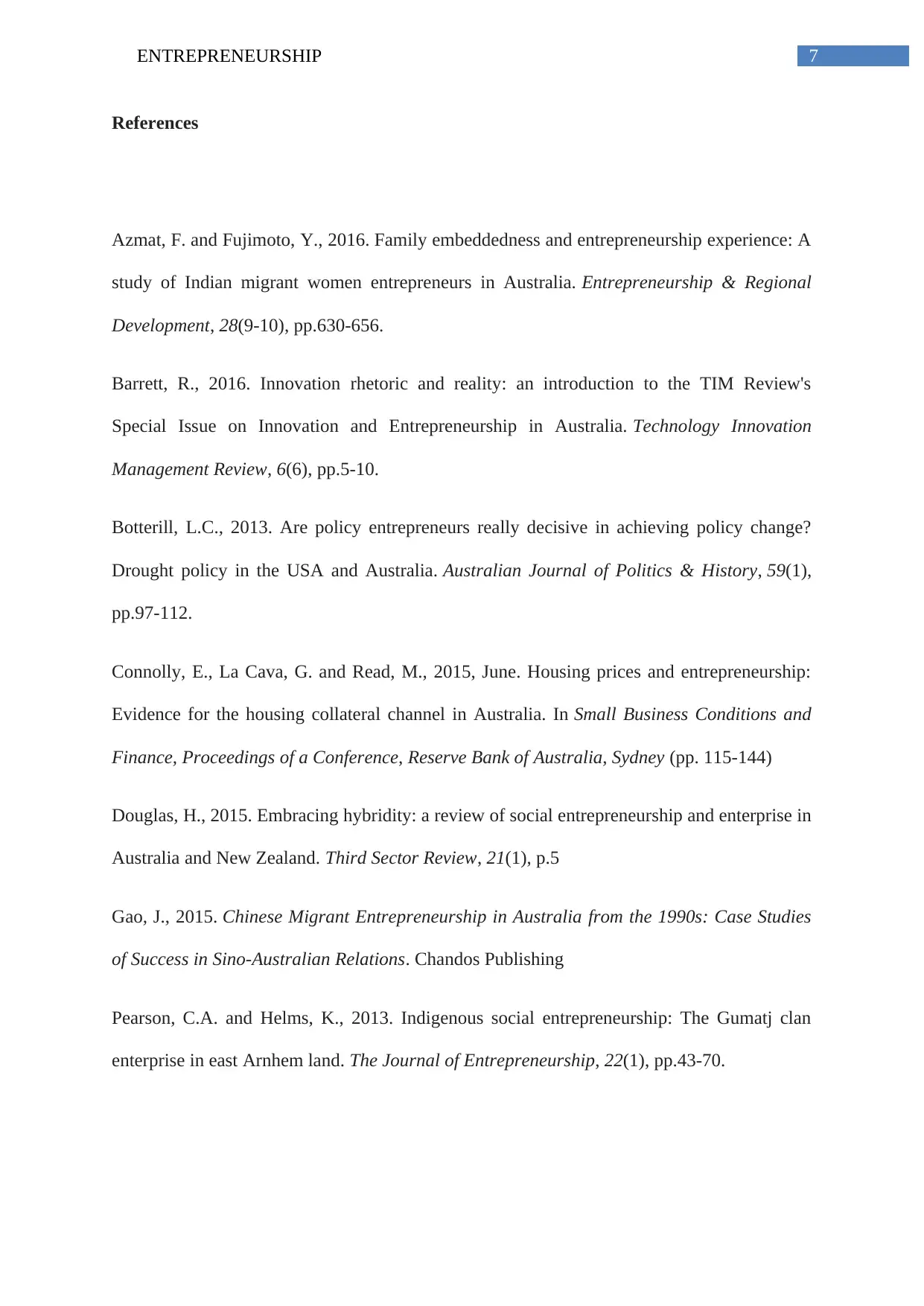
7ENTREPRENEURSHIP
References
Azmat, F. and Fujimoto, Y., 2016. Family embeddedness and entrepreneurship experience: A
study of Indian migrant women entrepreneurs in Australia. Entrepreneurship & Regional
Development, 28(9-10), pp.630-656.
Barrett, R., 2016. Innovation rhetoric and reality: an introduction to the TIM Review's
Special Issue on Innovation and Entrepreneurship in Australia. Technology Innovation
Management Review, 6(6), pp.5-10.
Botterill, L.C., 2013. Are policy entrepreneurs really decisive in achieving policy change?
Drought policy in the USA and Australia. Australian Journal of Politics & History, 59(1),
pp.97-112.
Connolly, E., La Cava, G. and Read, M., 2015, June. Housing prices and entrepreneurship:
Evidence for the housing collateral channel in Australia. In Small Business Conditions and
Finance, Proceedings of a Conference, Reserve Bank of Australia, Sydney (pp. 115-144)
Douglas, H., 2015. Embracing hybridity: a review of social entrepreneurship and enterprise in
Australia and New Zealand. Third Sector Review, 21(1), p.5
Gao, J., 2015. Chinese Migrant Entrepreneurship in Australia from the 1990s: Case Studies
of Success in Sino-Australian Relations. Chandos Publishing
Pearson, C.A. and Helms, K., 2013. Indigenous social entrepreneurship: The Gumatj clan
enterprise in east Arnhem land. The Journal of Entrepreneurship, 22(1), pp.43-70.
References
Azmat, F. and Fujimoto, Y., 2016. Family embeddedness and entrepreneurship experience: A
study of Indian migrant women entrepreneurs in Australia. Entrepreneurship & Regional
Development, 28(9-10), pp.630-656.
Barrett, R., 2016. Innovation rhetoric and reality: an introduction to the TIM Review's
Special Issue on Innovation and Entrepreneurship in Australia. Technology Innovation
Management Review, 6(6), pp.5-10.
Botterill, L.C., 2013. Are policy entrepreneurs really decisive in achieving policy change?
Drought policy in the USA and Australia. Australian Journal of Politics & History, 59(1),
pp.97-112.
Connolly, E., La Cava, G. and Read, M., 2015, June. Housing prices and entrepreneurship:
Evidence for the housing collateral channel in Australia. In Small Business Conditions and
Finance, Proceedings of a Conference, Reserve Bank of Australia, Sydney (pp. 115-144)
Douglas, H., 2015. Embracing hybridity: a review of social entrepreneurship and enterprise in
Australia and New Zealand. Third Sector Review, 21(1), p.5
Gao, J., 2015. Chinese Migrant Entrepreneurship in Australia from the 1990s: Case Studies
of Success in Sino-Australian Relations. Chandos Publishing
Pearson, C.A. and Helms, K., 2013. Indigenous social entrepreneurship: The Gumatj clan
enterprise in east Arnhem land. The Journal of Entrepreneurship, 22(1), pp.43-70.
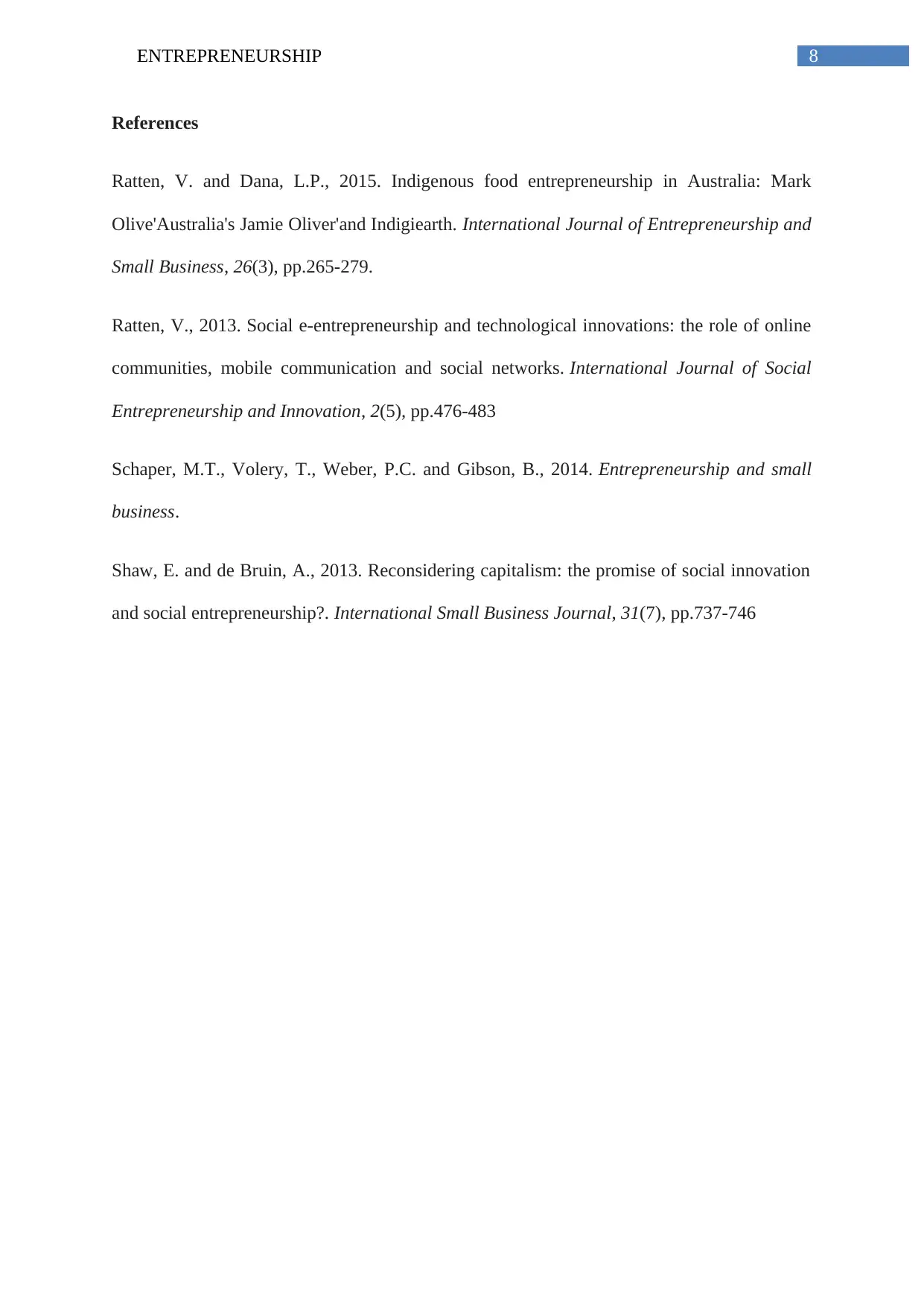
8ENTREPRENEURSHIP
References
Ratten, V. and Dana, L.P., 2015. Indigenous food entrepreneurship in Australia: Mark
Olive'Australia's Jamie Oliver'and Indigiearth. International Journal of Entrepreneurship and
Small Business, 26(3), pp.265-279.
Ratten, V., 2013. Social e-entrepreneurship and technological innovations: the role of online
communities, mobile communication and social networks. International Journal of Social
Entrepreneurship and Innovation, 2(5), pp.476-483
Schaper, M.T., Volery, T., Weber, P.C. and Gibson, B., 2014. Entrepreneurship and small
business.
Shaw, E. and de Bruin, A., 2013. Reconsidering capitalism: the promise of social innovation
and social entrepreneurship?. International Small Business Journal, 31(7), pp.737-746
References
Ratten, V. and Dana, L.P., 2015. Indigenous food entrepreneurship in Australia: Mark
Olive'Australia's Jamie Oliver'and Indigiearth. International Journal of Entrepreneurship and
Small Business, 26(3), pp.265-279.
Ratten, V., 2013. Social e-entrepreneurship and technological innovations: the role of online
communities, mobile communication and social networks. International Journal of Social
Entrepreneurship and Innovation, 2(5), pp.476-483
Schaper, M.T., Volery, T., Weber, P.C. and Gibson, B., 2014. Entrepreneurship and small
business.
Shaw, E. and de Bruin, A., 2013. Reconsidering capitalism: the promise of social innovation
and social entrepreneurship?. International Small Business Journal, 31(7), pp.737-746
⊘ This is a preview!⊘
Do you want full access?
Subscribe today to unlock all pages.

Trusted by 1+ million students worldwide
1 out of 9
Related Documents
Your All-in-One AI-Powered Toolkit for Academic Success.
+13062052269
info@desklib.com
Available 24*7 on WhatsApp / Email
![[object Object]](/_next/static/media/star-bottom.7253800d.svg)
Unlock your academic potential
Copyright © 2020–2025 A2Z Services. All Rights Reserved. Developed and managed by ZUCOL.





